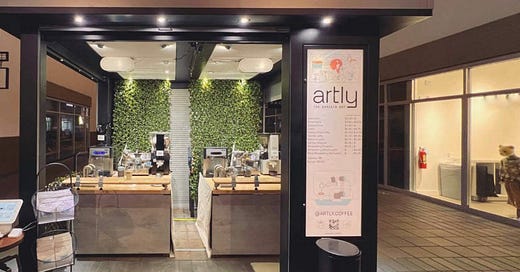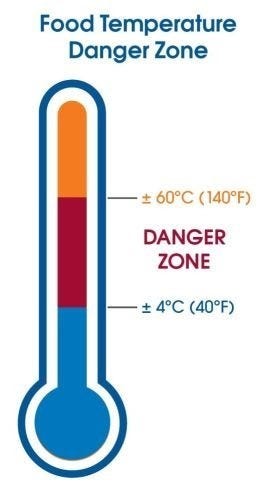Highway to the Danger Zone
Plus Goodbye Blue Hill Coffee, Delivers.AI raises money and Robomart gets a patent.
Quick personal note:
Before we begin, I just want to thank all of you for your patience over the past couple of weeks as I’ve been in the midst of a family emergency. This is one of those situations where there isn’t a clean “it’s all better!” moment. But we have reached a solution that will allow me to re-surface more fully with more stories and analysis next week.
Sorry. This is a real bummer of a way to start this week’s issue. Just do yourself a favor — call your parents. They’d love to hear from you.
OK. Back to business.
Scoop! Blue Hill Coffee Gets All Artly
You’d be forgiven if you hadn’t yet heard of Blue Hill Coffee. Up until recently, the Seattle-based startup only had two of its robot baristas installed in Portland, Oregon (where the dream of the ‘90s is alive).
But Blue Hill Coffee is no more. We got the scoop this week that the company has officially changed its name to Artly — and it’s installed three more coffee robots in San Francisco.
There’s one reason to pay attention to Artly — computer vision. The company’s founder, Meng Wang was CTO at Orbeus, which developed the Rekognition computer vision/image analysis system (Orbeus was acquired by Amazon, which re-branded the tech as AWS Rekognition).
Artly’s computer vision system trains the robotic arm to move like a human barista, allowing it to do things like make latte art. But the computer vision also provides the robot context. It can find the “oat milk,” no matter where you place it. I explain more about its technology and it’s go-to market back at the site (so go read the full story!).
Artly’s new SF robots are at San Francisco Premium Outlets, and the Stoneridge Shopping Center. Over on Linkedin, a reader suggested that this was a bad move, given the lack of foot traffic (thank you, Omicron!). But I think lower volume is actually a good thing for Artly. The company is trying to create more of a premium coffee experience, not a high-throughput machine. Starting off small will allow the company to refine its technology without diving into the deep end and needing to keep up with constant, heavy demand. What do you think?
Since we’re talking coffee robots, be sure to check out the OttOmate Guide to Robot Baristas!
Unlock more scoops, more analysis and more swag! Become a paid OttOmate subscriber!
€750,000 Seed Round Delivered to Delivers.AI
This week, OttOmate learned that London-based robot delivery startup Delivers.AI has raised a €750,000 (~ $850,000 USD) Seed round of funding. The company said it was going to use the new funds to expand its operations in the U.K.
That isn’t a ton of money, but so far Delivers.AI is the only robot delivery startup we know of that is making aggressive moves in Europe. The company has delivery deals in place in Turkey and Spain, and is working with regional authorities in the U.K.’s West Midlands and Munich, Germany.
Head over to OttOmate.news, where I break down why Delivers.AI is so bullish on Europe and explain that while rival U.K. robot delivery startup Starship may have more funding, it might not be that big a competitor (for now).
Highway to the DAYNJA ZONE
Here’s a dirty little secret — though I’ve been writing about food technology for five years now, I really don’t like to cook. I’m always afraid I’ll undercook something and make people sick, so I overcook it until it’s leather or charred to a crisp.
The nice thing about food robots is that they can precisely control and monitor the temperature of food at all times. That is, if those food robots are built and tested properly.
In this week’s installment of the OttOmate Guide to NSF Certification, Ann Willems, Business Lead Product Certification - EMEA Region at NSF BELGIUM walks you through the basics of temperature requirements and validation. Here’s a snippet:
The “Temperature Danger Zone” for Food
Bacteria such as Salmonella and E. Coli are some of the most well-known and widespread bacteria relevant to food contamination. They grow most rapidly in temperatures ranging from 4°-5°C (40°-41°F) and 60°-63°C (140°-145°F), doubling in as little as 20 minutes. These temperature ranges are often called the "danger zones.”
As part of the NSF certification process, machines undergo testing to ensure they are able to (when applicable):
Store food at a safe temperature (either refrigerated or heated).
Cool down or reheat food past this “danger zone” in the shortest time possible.
Testing Requirements
To simulate a normal-use environment, all tests are performed in a calibrated climate chamber capable of maintaining stable ambient temperatures and (sometimes) humidity around the unit. This helps create uniform conditions that are close to “real life.”
Refrigerated equipment is typically tested in ambient conditions of 38°C (100°F) for long-term storage equipment such as refrigerators or freezers, or 30°C (86°F) for short term storage such as drinks dispensers with fresh beverages.
Heated storage equipment such as hot display cases or soup stations are tested in 23°C (73°F) ambient conditions.
And be sure to check out the full NSF Guide to learn more about the nuts and bolts of food safety for your robot or appliance.
RoboMart Gets a “One Tap” Patent
Los Angeles-based mobile commerce company Robomart announced this week that it has been granted a U.S. patent for its store hailing and checkout-free technology.
Robomart’s pitch is that instead of you going out to a store for snacks and sundries, it brings the store to you. Using the Robomart app, you can hail a van filled with goodies to your front door, grab items you want from its inventory and get charged automatically. Robomart says the average completion for one of its sales takes nine minutes.
There’s a big debate in the industry right now around super fast grocery delivery. Startups around the world have raised billions promising to get you goods in 15 minutes or less. But those all operate from fixed locations and require people and systems to pack and deliver the order.
Could fleets of mobile commerce vans roaming city streets replace those speedy startups? Robomart and all mobile e-commerce companies will face similar scaling questions as existing speedy delivery grocers — but at least Robomart has a patent now to help protect its business as it looks to expand.
That’s it for this week. Thanks for reading!
Stay cool. Have a great summer. Class of ‘90 rulez.
And for real, call your parents.






